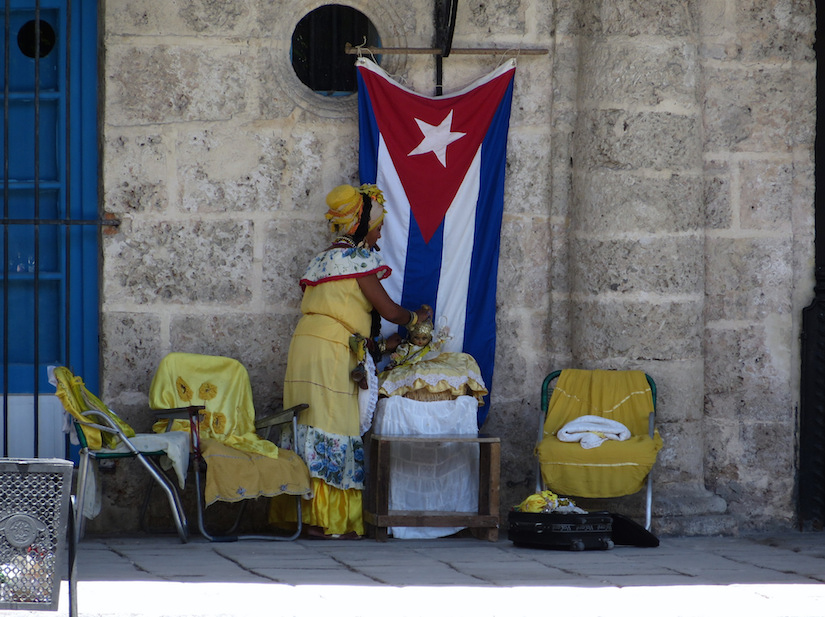I visited the only communist paradise in the new world and found Cuba to be unexpectedly cool. Not the weather, the music. There was music everywhere: in clubs and restaurants, in parks, at lunch joints, on street corners – – day and night. Of course with my tin ear I was never certain if I was listening to salsa, rumba, cha-cha, mambo, meringue, son, trova, or reggaeton…all distinctive Cuban sounds that they have originated and shared with the world. And such music is a gateway drug to dancing.
Occasionally, a couple would get up from their lunch table in mid meal and salsa their way towards the live band entertaining us while we ate. Public squares – – being public – -offered another outlet for exhibitionistic dancers just as long as a band was playing. Cuban music + dance are addictive. I even took a salsa lesson but didn’t get much further than counting the steps in my head before I got distracted and wrong-footed. Despite what you may think of this dictatorship, don’t criticize their music. It is world class.
And there are some other aspects of Cuba that are surprisingly world class. Like their education system. Literacy rate is over 99%, the same as the US, UK, and Sweden and ahead of all the BRICS. Medicine is top notch there as well, delivering life expectancy of 79.4 years. The US is just a few months longer, 79.8 years. And their life expectancy is accomplished in a relatively poor country that has had an economic blockade around it for the past half century. Their medical outcomes, by some measures, similar to the US, are achieved at a fraction of the cost. The Cubans have virtually wiped out malaria from their tropical nation and have trained so many doctors that they share them with other poor nations.
They are also very good mechanics. The thousands of 1950s era automobiles are still running (and polluting just a bit too.) At times I felt like I was on a 50s movie set. Many are offered up as retro taxicabs.
But before you think this is a paean to Cuban communism, let me point out a couple of things that their system lacks: freedom and a market economy.
I found some people too fearful of police to talk to and walk with me on the street. After a few strides they politely bid me farewell and slipped away. The guys trying to sell me Cuban rum and Cohiba cigars were not fearful. Their product was possibly counterfeit anyway.
GDP per capita (according to the World Bank) ranks Cuba 60 out of 185 countries tracked. Just below Turkey and slightly above Mexico. Only problem is the people don’t really benefit directly. Most businesses are still run by the state. And the related professions don’t pay well. I spoke with a ballet instructor who can’t afford to buy a cell phone SIM card on her government ballet teacher’s salary. There are no private ballet teachers or private dance schools.
There are two currencies. Moneda Nacional for ordinary Cubans and convertible pesos (CUC) for visitors…and for lucky Cubans who can get their hands on some. Those with CUC can spend them in the finer shops and restaurants. Those with only Moneda Nacional must make do with the government stores. I went into one of the ration stores where the everyday Cubans must purchase their rationed food items. There was very little on the shelves and very little variety as well. Looked a bit like a rundown 7-11 that had been closed for a couple of years. Everyday Cubans don’t have access to CUC and hence better clothing, restaurants, food, and goods. Not that they could afford them on their government salaries anyway.
One of the business sectors newly opened to private ownership is small restaurants, called paladares. They are typically found in a private home. Several Americans who had previously visited Cuba extolled the virtues of these paladares. Generally I found them to be not yet a culinary delight. Like state owned restaurants, they too are limited to the raw ingredients that the government’s command economy is able to deliver. Canned green beans appeared on my plate far too often.
As would be expected in a dictatorship, communication is well under the thumb of the state. In the beautiful rural town of Viñales in the west I tracked down an Internet café so that I could let my loved ones know that I was still free. The Internet cafe was located in the post office, but before I could log on I was required to cross the street to the local ETECSA office. This is the government communications monopoly. Their Viñales branch was housed in a large shipping container. It had a door and a customer service window cut through the metal wall. My passport and a few CUC (convertible pesos) were requested. They gave me a scratch card which I took back across the street to the post office/internet café where I entered the code from the scratch card into my Internet browser. All worked well and I was surprised to find access to several western news sources. (Time, The Economist, New York Times, et al.)
After a ten day assessment I conclude that Cuba delivers some things surprisingly well for a poor country: medicine, education, music, culture. Actually Cuba is not really a poor country, just a blockaded country with a command economy.
I figure three changes would make this an even better place:
• More personal freedom
• A market economy
• Removal by the US of its blockade.
Let’s do all three.

